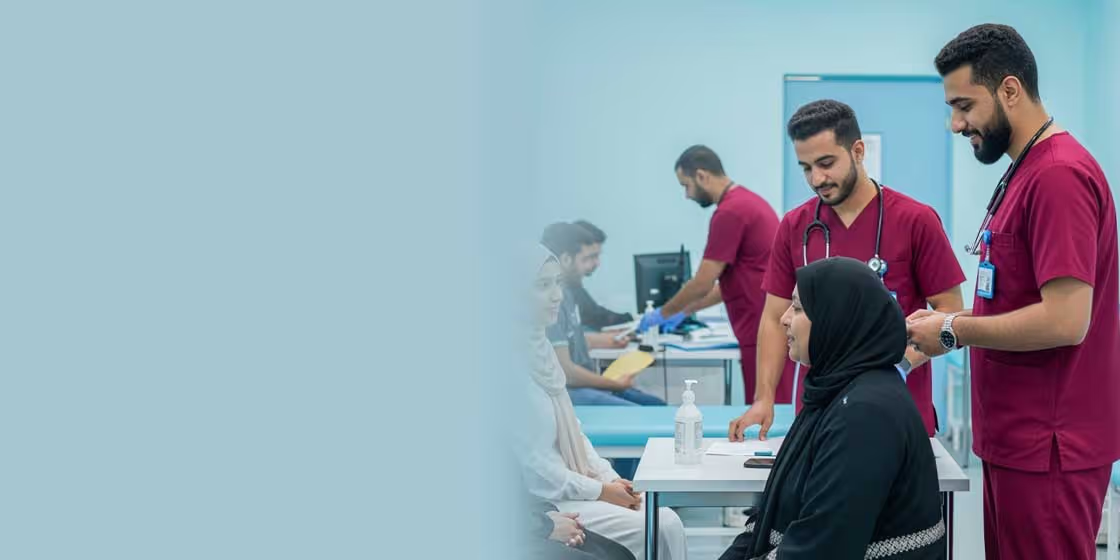Before you continue
By clicking “Accept All”, you agree to the storing of cookies on your device to enhance site navigation, analyze site usage, and assist in our marketing efforts.

The Master of Science in Community Health Nursing (MSNM) program meets Saudi healthcare marketing need for qualified, competent Saudi community nurse specialists who can provide culturally sensitive holistic care and improve the quality of care in all healthcare sectors. Saudi community nurse specialist who shares culture and language of the Saudi society will be more competent in communicating with patients and their families for providing healthcare services and health education to the wider patient population.
In the coming years, the Kingdom will prioritize investment in and expansion of higher-education facilities in order to produce a high-quality workforce. The efforts of the Saudi government to sponsor thousands of Saudi men and women to enroll in the postgraduate studies will have positive influences on the community as a participant in global higher education.
Graduates of the MSc Community Health Nursing Program have high expectations of employment, which are very challenging to meet in the current managerial post in the Primary care facilities within the Kingdom. Growth and Saudization will make the healthcare sector one of the top fields in which there will be a high demand for graduates.
The graduates of the MSc program at FCMS will be well prepared with the required advanced skills and clinical training to succeed in their endeavors to deliver healthcare within the Kingdom and beyond.
The MSc Community Health Nursing Program will:
Different teaching and learning strategies will be implemented to achieve course learning outcomes. The focus will be on student-centered teaching strategies such as small group discussion, flipped classes, student prepared presentation, assignments, case-based learning, and research-related activities.
Direct and indirect assessment methods will be implemented to assess students’ performance in each course. Direct assessment methods include written exams (MCQs and Essay questions), written assignments using rubric, presentation using rubric, reflection, daily log, research and evidence-based activities, and community service activities. Indirect assessment will be conducted via Course Learning Outcomes (CLOs) survey for each course; done by the end of each semester.
After completion of the MSc Community Health Nursing program (and after completing 2 years of experience post-graduation), the graduates of the Community Health Nursing Master program will be eligible to apply for the Saudi Commission for Health Specialist (SCFHS) to go for an exam to get the title of “Senior Specialist” in the field. The graduates of the program will be eligible to work in community and public health settings, governmental and private institutions, as well as academia.
The graduates of the Community Health Nursing Master program will be eligible to be hired in community and public health positions in different community subsystems including health, education, and environmental- and work-related facilities. Graduates of the program will be able to work on the three levels of prevention where applicable, implement community and facility assessment, do asset assessment, and plan and implement community programs. Proper interdisciplinary collaboration is required to achieve such tasks and responsibilities. Furthermore, graduates of the Community Health Nursing Master program will be able to join academic institutions to work as clinical instructors and integrate evidence-based practice with their teaching responsibilities. Additionally, the graduates of the program can pursue their Doctoral degree in Community Health Nursing from sound, well-known universities to strengthen their research abilities and become producers of research. This track will enable them to enhance this specialty by increasing the body of knowledge in this field.
Graduates of the program are advised to seek job opportunities related to community and public health. Their input in the career will be influential if they implement their knowledge in community settings and populations including primary health care, patient education, school health, environmental health, and occupational health. Building strong network of collaboration with other community systems is of high value as the community programs that lack interdisciplinary collaboration are not effective enough in meeting their goals. Continuous education including courses, workshops, and seminars are essential to stay updated in the field. Finally, higher academic degrees in the specialty will be influential in enhancing knowledge and career outcomes for years to come.